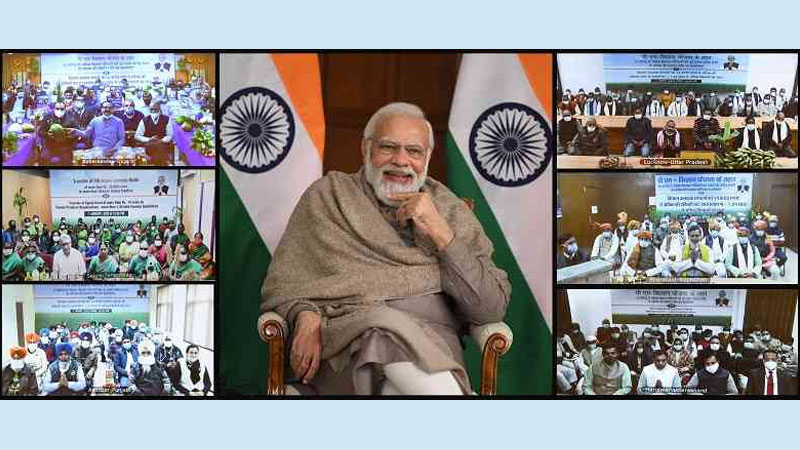In line with the continued commitment and resolve to empower grassroot level farmers, Prime Minister Shri Narendra Modi released 10th instalment of financial benefit under Pradhan Mantri Kisan Samman Nidhi (PM-KISAN) scheme on January 01, 2022. This enabled the transfer of an amount of more than Rs. 20,000 crore to more than 10 crore beneficiary farmer families.During the programme, Prime Minister also released equity grant of more than Rs. 14 crore to about 351 Farmer Producer Organizations (FPOs), which will benefit more than 1.24 lakh farmers. The Prime Minister interacted with FPOs during the event. Union Minister Shri Narendra Singh Tomar and Chief Ministers, LGs, Agriculture Ministers and farmers from several states were linked to the event.
Speaking about the economy, the Prime Minister said that on many parameter, Indian economy is looking better than pre-covid days. He pointed out that “today the growth rate of our economy is more than 8%. Record foreign investment has come to India. Our forex reserves have reached record levels. Old records have also been surpassed in GST collection. We have also set new records in the matter of exports, especially in agriculture.” He said that in 2021 transaction of more than 70 lakh crore rupees was done on UPI. More than 50 thousand start-ups are working in India out of these 10 thousand came up during last six months.
The Prime Minister said that PM Kisan Samman Nidhi is a big support for India’s farmers. If we include today’s transfer, more than 1.80 lakh crore rupees have been transferred directly to the accounts of the farmers, he said.
The Prime Minister talked about the milestones that were achieved in the agriculture sector in the recent years. Food grain production touched 300 million tonnes, similarly Horticulture and floriculture production reached 330 million tonnes. Milk production also increased almost 45 per cent in last 6-7 years. About 60 lakh hectare land was brought under micro irrigation; more than 1 lakh crore were given in compensation under Prime Minister FasalBimaYojna, whereas premium received was just 21 thousand crores. Ethanol production increased from 40 crore litres to 340 crore litres in just seven years. The Prime Minister also informed about the Goberdhan Scheme to promote bio-gas. If there will be value in cow dung, he said, the non miltching animals will not be burden on farmers.
The Prime Minister said that through FPO’s small farmers are feeling the power of collective strength. He pointed out five benefits of FPOs for small farmers. These benefits are increased bargaining power, scale, innovation, risk management and adaptability to the market conditions. Keeping in mind the benefits of FPO’s the government is promoting them at every level. These FPOs are getting help of upto 15 lakh rupees. As a result, FPOs like Organic FPOs, Oil Seed FPOs, Bamboo clusters and Honey FPOs are coming up all over the country. “Today our farmers are benefitting from the schemes like ‘One District One Products’ and markets, both nation and global, are opening for them”, the Prime Minister said. He said that reliance on imports is being reduced by schemes like National Palm Oil Mission with a budget of 11 thousand crore rupees.
@Jagat Prakash Nadda
Modi government has always been dedicated to the welfare of farmers. I thank PM Shri Narendra Modi from my heart for releasing tenth installment of more than Rs 20,000 crore on the first day of New Year 2022 under #PMKisan to more than 10 crore farmer families of the country.
Amit Shah expresses gratitude to PM Modi for transferring Rs. 20,000 crore
Union Home and Cooperation Minister Shri Amit Shah expressed his gratitude to the Prime Minister Shri Narendra Modi for transferring Rs. 20,000 crore in the accounts of 10 crore farmers under the PMKisan Yojana on the very first day of 2022.
The Union Home Minister said in a series of tweets that “without farmer empowerment the overall development of the country is not possible and the country has seen the farmer-friendly Modi government, making continuous efforts to make farmers self-reliant, since the last seven years.”


